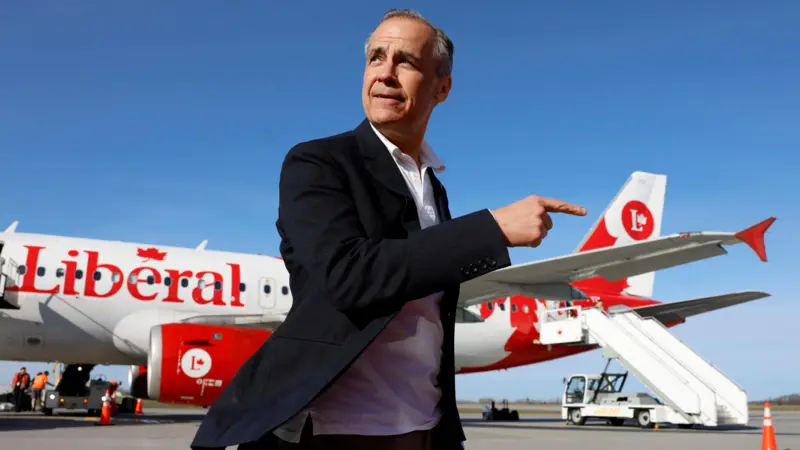OTTAWA — Mark Carney has delivered a dramatic comeback victory for Canada’s Liberal Party in Monday’s federal election, overcoming months of polling deficits and securing his first seat in Parliament as prime minister. The former central banker’s win marks a historic turning point for the Liberals, who faced a daunting path to re-election just three months ago before Carney replaced Justin Trudeau as party leader.

The Liberals are projected to return to government—although likely with a minority—while Conservative leader Pierre Poilievre, once favored to become prime minister, is now projected to lose his own parliamentary seat. Carney’s decisive win in the Ontario riding of Nepean, where he captured 64% of the vote, solidified his political debut. Conservative Barbara Bal trailed with 33%, while the New Democratic Party’s Shyam Shukla garnered just 2%.
In his victory speech, Carney drew international attention with a direct rebuke of U.S. President Donald Trump: “President Trump is trying to break us so that America can own us—that will never ever happen.” His sharp rhetoric and pro-globalist stance have resonated with Canadian voters alarmed by Trump’s recent tariffs on Canadian goods and veiled threats to annex parts of the country.
The campaign’s final stretch was dominated by cross-border tensions, with Trump’s aggressive trade actions galvanizing support for Carney. Polling experts credit Trump’s controversial moves with swinging momentum toward the Liberals, as anti-American sentiment fueled a surge in center-left support.

While the Liberal Party’s return to power appears confirmed, whether Carney can secure a governing majority remains uncertain. If not, he will likely need to negotiate with smaller parties, including the NDP or Bloc Québécois, to form a stable minority government.
International observers are closely watching Carney’s rise. A former governor of both the Bank of England and Bank of Canada, Carney is seen as uniquely positioned to lead Canada through economic turbulence while promoting a multilateralist vision that counters Trump’s protectionism. His prior experience lends immediate credibility on the world stage, say analysts.
“Canada is ready to take a leadership role in building a coalition of like-minded countries who share our values,” Carney said earlier this month. “If the United States no longer wants to lead, Canada will.”
Australian strategists, observing parallels ahead of their May 3 election, say Carney’s win could boost support for the center-left Labor Party as voters abroad respond similarly to Trump’s global provocations. Canada currently holds the G7 presidency, giving Carney a timely platform to shape international alliances.
Former Canadian diplomat Colin Robertson praised Carney’s preparedness, citing his deep economic expertise and international network. “He goes in extremely well-prepared, with a superb Rolodex. People will take his call,” Robertson said.
Carney is expected to prioritize trade diversification by expanding partnerships with the EU, Japan, Australia, and other democracies to mitigate the impact of U.S. tariffs on Canadian aluminum, steel, and auto exports. His government also plans to boost infrastructure and accelerate military spending while reducing Canada’s dependence on American defense procurement.
Despite his early momentum, experts caution that Carney must strike a careful balance on the world stage. “He and Canada have an interest in coordinating with like-minded countries, but without necessarily setting up Canada as the organizer of an opposition,” said Roland Paris, a former Trudeau adviser. “Why turn Canada into that kind of target?”

Observers say Carney’s composed demeanor could help de-escalate tensions with Washington, even as he asserts Canadian sovereignty. A key test may come at the June G7 summit in Alberta, where Carney is expected to meet Trump and Mexican President Claudia Sheinbaum to discuss trade.
Still, some analysts doubt whether Canada, with its underfunded military and middling economy, can exert Merkel- or Macron-level global influence. “The erosion of Canada’s standing in the world will prevent him from being a true leader of the Western world,” said Chris Hernandez-Roy of the Center for Strategic and International Studies.
Nevertheless, Carney’s win is being seen as a cautionary tale for conservatives worldwide. Trump’s looming presence and his antagonistic posture toward Canada appear to have backfired, not only strengthening the Liberals’ standing but weakening conservative unity.
In Australia, the Trump effect is similarly hurting opposition leader Peter Dutton, with polls now favoring Labor. “Trump has been a wrecking ball through the conservative coalition here,” said Andrew Carswell, former adviser to former Prime Minister Scott Morrison.
In Europe, right-wing leaders like Hungary’s Viktor Orbán are facing increased pressure as their alliances with Trump strain public support amid economic anxieties.
For Carney, the path ahead will involve both domestic repair and international coalition-building. While the magnitude of his global influence remains uncertain, his election marks a defining moment for Canadian politics in the Trump era.



